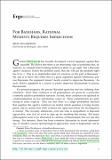Files in this item
For Bayesians, rational modesty requires imprecision
Item metadata
| dc.contributor.author | Weatherson, Brian James | |
| dc.date.accessioned | 2015-10-01T23:12:48Z | |
| dc.date.available | 2015-10-01T23:12:48Z | |
| dc.date.issued | 2015 | |
| dc.identifier.citation | Weatherson , B J 2015 , ' For Bayesians, rational modesty requires imprecision ' , Ergo , vol. 2 , no. 20 , 20 . https://doi.org/10.3998/ergo.12405314.0002.020 | en |
| dc.identifier.issn | 2330-4014 | |
| dc.identifier.other | PURE: 220298289 | |
| dc.identifier.other | PURE UUID: e9ad89c2-1a40-409d-8ffe-bd1fba07518d | |
| dc.identifier.uri | https://hdl.handle.net/10023/7582 | |
| dc.description.abstract | Gordon Belot (2013) has recently developed a novel argument against Bayesianism. He shows that there is an interesting class of problems that, intuitively, no rational belief forming method is likely to get right. But a Bayesian agent’s credence, before the problem starts, that she will get the problem right has to be 1. This is an implausible kind of immodesty on the part of Bayesians. My aim is to show that while this is a good argument against traditional, precise Bayesians, the argument doesn’t neatly extend to imprecise Bayesians. As such, Belot’s argument is a reason to prefer imprecise Bayesianism to precise Bayesianism. | |
| dc.language.iso | eng | |
| dc.relation.ispartof | Ergo | en |
| dc.rights | Copyright 2015 the Author. This work is licensed under a Creative Commons Attribution-NonCommercial-NoDerivatives 3.0 License. | en |
| dc.subject | B Philosophy (General) | en |
| dc.subject.lcc | B1 | en |
| dc.title | For Bayesians, rational modesty requires imprecision | en |
| dc.type | Journal article | en |
| dc.description.version | https://doi.org/Publisher PDF | en |
| dc.contributor.institution | University of St Andrews. School of Philosophical, Anthropological and Film Studies | en |
| dc.contributor.institution | University of St Andrews. Philosophy | en |
| dc.identifier.doi | https://doi.org/10.3998/ergo.12405314.0002.020 | |
| dc.description.status | Peer reviewed | en |
This item appears in the following Collection(s)
Items in the St Andrews Research Repository are protected by copyright, with all rights reserved, unless otherwise indicated.

